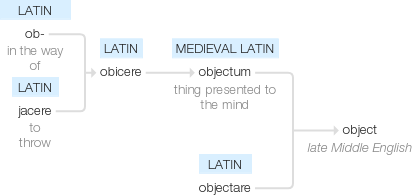Object
late Middle English: from medieval Latin objectum ‘thing presented to the mind’, neuter past participle (used as a noun) of Latin obicere, from ob- ‘in the way of’ + jacere ‘to throw’; the verb may also partly represent the Latin frequentative objectare .
wiktionary
From Old French object, from Medieval Latin obiectum(“object”, literally “thrown against”), from obiectus, perfect passive participle of obiciō(“I throw against”), from ob-(“against”) + iaciō(“I throw”), as a gloss of Ancient Greek ἀντικείμενον(antikeímenon).
etymonline
object (n.)
late 14c., "tangible thing, something perceived with or presented to the senses," from Old French object and directly from Medieval Latin obiectum "thing put before" (the mind or sight), noun use of neuter of Latin obiectus "lying before, opposite" (as a noun in classical Latin, "charges, accusations"), past participle of obicere "to present, oppose, cast in the way of," from ob "in front of, towards, against" (see ob-) + iacere "to throw" (from PIE root *ye- "to throw, impel").
Sense of "purpose, thing aimed at" is from early 15c., from Latin obiectus "that which presents itself to the sight." Meaning "that toward which a cognitive act is directed" is from 1580s. Grammatical sense of "a member of a sentence expressing that on which the action of the verb is exerted" is from 1729.
No object "not a thing regarded as important" is from 1782, in which the sense of object is "obstacle, hindrance" (c. 1500). As an adjective, "presented to the senses," from late 14c. Object-lesson "instruction conveyed by examination of a material object" is from 1831.
object (v.)
c. 1400, objecten, "to bring forward as a ground of opposition, doubt, or criticism; raise an argument against (a proposition, line of reasoning, etc.)," from Old French objecter and directly from Latin obiectus, past participle of obiectare "to cite as grounds for disapproval, set against, oppose," literally "to put or throw before or against," frequentative of obicere (see object (n.)). Related: Objected; objecting.
